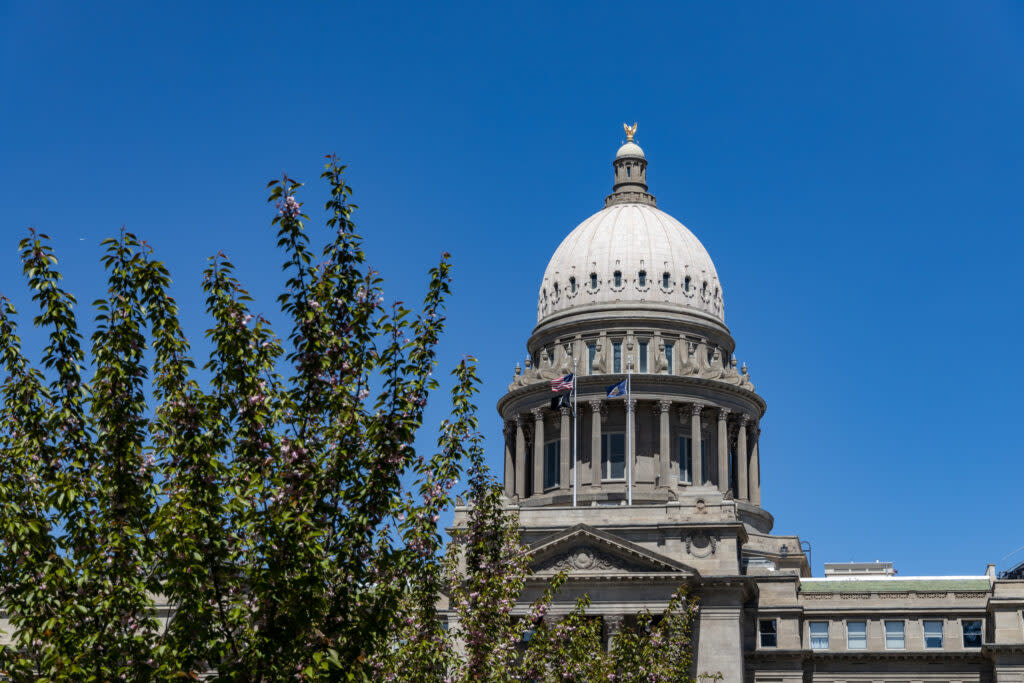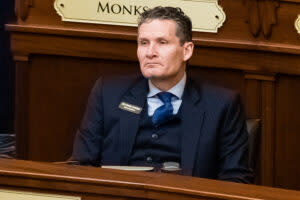Idaho legislative committee won’t accept remote testimony amid school tax credit debate

The Idaho State Capitol building in Boise on May 5, 2021. (Otto Kitsinger for Idaho Mountain Sun)
The Idaho House Revenue and Taxation Committee will not accept remote, virtual testimony on bills this legislative session, Rep. David Cannon told the Idaho Capital Sun.
Idaho Rep. David M. Cannon, R-Blackfoot, listens to proceedings on the first day of the session on Jan. 8, 2024, at the State Capitol building in Boise. (Otto Kitsinger for Idaho Capital Sun)
In use since at least 2018, remote testimony is an optional tool that allows Idahoans from across the state to be able to testify remotely to Idaho legislators over Zoom without having to physically be at the Idaho State Capitol in downtown Boise.
Several Idahoans have written to Cannon asking him to allow remote testimony, particularly for House Bill 447, a school choice bill that would create a refundable tax credit of up to $5,000 for eligible expenses including tuition at a private school or private religious school.
“This is unacceptable,” wrote Karole Honas, the longtime former Local News 8 anchor from eastern Idaho in an open letter that Reclaim Idaho shared Feb. 22. “Remote testimony allows citizens from outside Boise to have a voice in the lawmaking process.”
Idaho legislator cites previous policies on remote testimony for committee
In an interview at the Idaho State Capitol on Monday, Cannon said he is not allowing remote testimony because that was one of previous Chairman Jason Monks’ policies. Cannon became chairman of the committee Feb. 15, after a Republican leadership showdown that ultimately led to Monks, R-Meridian, being named House majority leader.
Cannon said he will continue to follow all of Monks’ policies and procedures for the remainder of the session. Cannon also said he was concerned it could be confusing or come across as politically motivated if he changed policies in the middle of an ongoing legislative session.
“I assumed chairmanship of the committee under somewhat unusual circumstances,” Cannon told the Sun. “Most start the session as a committee chair and set policies they follow throughout the session. In my case, halfway through the session was when I got the assignment.”
GET THE MORNING HEADLINES DELIVERED TO YOUR INBOX
“Without regard to any legislation in the pipeline or any consideration of any specific policy, the first thing I decided was, in the spirit of continuity of the committee, to just not change mid-stream any policy set by (previous) Chairman Monks,” Cannon added.
Cannon had previously served as the House Revenue and Taxation Committee’s vice chairman under Monks until the change earlier this month.
Cannon said Idahoans who cannot make it to the Capitol in Boise can share their perspectives over the school choice tax credit bill or any other bill going in front of the House Revenue and Taxation Committee via email. In order to do so, Cannon said people need to specify what bill they are writing about (the school choice bill is House Bill 447, for example) and specify that they wish for their email to be considered as written testimony. Emails for written testimony to the House Revenue and Taxation Committee should be sent to hrev@house.idaho.gov, Cannon said.
Why are some Idahoans pushing for remote testimony?
In her open letter, Honas asked other Idahoans to share her letter and add their name.
Patrice Yeatter of Kooskia saw Honas’ letter and emailed Cannon herself on Thursday. In the letter, Yeatter discussed the importance of remote testimony and came out in opposition to the school choice bill.
Need to get in touch?
Have a news tip?
“As tax-paying Idahoans, we expect our voices to be heard and considered equally. Kindly respect our opinions on all legislative issues, not just this one,” Yeatter wrote, in part.
In a telephone interview Monday, Yeatter said remote testimony allows more Idahoans from more parts of the state to have their testimony considered alongside people who are located in and around Boise. Yeatter lives in Kooskia, an Idaho County town located where the middle and south forks of the Clearwater River come together.
“My biggest objection is the fact that we are left out in the cold,” Yeatter said. “It’s bad enough the Legislature ignores these rural communities like ours. We are struggling in our schools. Our levy failed, and we might have to close our high school.”
Legislative committees in Idaho have offered remote testimony for a few years now. In 2018, the House Education Committee under now Sen. Julie VanOrden, R-Pingree, launched a new remote testimony project to help Idahoans testify over a bill without having to travel to Boise, Idaho Education News reported. During the 2022 session, legislators expanded remote testimony options to more bills and more committees, the Sun previously reported.
However, it is not mandatory to allow remote testimony and committee chairs are empowered to make many decisions about many committee procedures and decisions.
On Monday, Cannon told the Sun he has not yet scheduled a day to hear House Bill 447, the school choice tax credit bill. Once the hearing has been scheduled, Cannon said he will post an agenda to the Idaho Legislature’s website.
The post Idaho legislative committee won’t accept remote testimony amid school tax credit debate appeared first on Idaho Capital Sun.


